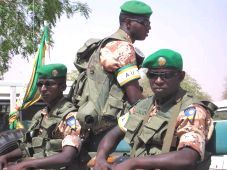AU force seen as target in Sudan’s Darfur
Oct 11, 2005 (TINE, Sudan/Chad border) — African Union troops in Sudan’s troubled Darfur region are in danger of being dragged into the conflict after rebels abducted and killed AU soldiers in a series of attacks targeting the neutral force.
 Five AU soldiers and civilian personnel were killed when rebels ambushed a convoy on Saturday, the force’s first losses in more than a year working in remote Darfur. The next day, another rebel group abducted and held hostage 38 AU troops in the Chadian-Sudanese border town of Tine.
Five AU soldiers and civilian personnel were killed when rebels ambushed a convoy on Saturday, the force’s first losses in more than a year working in remote Darfur. The next day, another rebel group abducted and held hostage 38 AU troops in the Chadian-Sudanese border town of Tine.
The attacks highlight the personal threat faced by the more than 6,000 troops deployed to monitor a much-violated ceeasefire in the desert region. AU forces have been abducted and disarmed by rebels and have come under fire many times while patrolling bandit-infested roads and investigating ceasefire violations.
But while two main rebel groups are represented at a political level at AU-sponsored peace talks in the Nigerian capital Abuja, commanders on the ground say the AU should leave Darfur and have warned them not to enter their areas.
“The AU are part of the conflict”, Mohamed Saleh, the leader of the rebel faction blamed for Sunday’s kidnappings, told Reuters.
Saleh split from the mainstream Justice and Equality Movement (JEM) earlier this year and went to Abuja during the last round. The AU ignored him, he said, so he would not listen to them now.
The third Darfur rebel movement, the National Movement for Reform and Development (NMRD), is also not at the Abuja talks. They want the AU out of Darfur:
“I don’t take any responsibility for their security if they enter our areas,” said NMRD political leader Khalil Abdallah. “I capture and I release them to anyone,” he said. Both groups deny involvement in Sunday’s kidnappings.
Non-Arab rebels took up arms against Khartoum in early 2003, accusing it of neglect and of monopolising power and wealth. Khartoum responded by arming mostly Arab miltias, who now stand accused of a widespread campaign of killing, looting and burning of non-Arab villages.
Tens of thousands have died in the violence, which the United States calls genocide — a charge Khartoum denies. The International Criminal Court is investigating alleged war crimes in Darfur.
AID AGENCIES AFRAID
Attacks and threats against the neutral AU force have caused concern among aid agencies working to provide vital humanitarian assistance to 2 million people who fled their homes to wretched camps in the vast region the size of France.The AU’s role includes protection of aid workers.
Many non-governmental organisations (NGOs) refuse to travel with an AU escort, despite a recent escalation of attacks by armed gangs targeting aid convoys.
“Every aid agency wants to gain a neutrality so that they are netural in the conflict,” said U.N. official Andy Pendleton who works in West Darfur state. “Some agencies feel if are associated with any armed elements, even the AU,…this is an association they don’t want.”
NGO workers say they fear the AU attracts fire and that they may get caught in cross fire, which would affect their relations with all the parties of the conflict.
But this means vital aid operations are often stalled.
MANDATE PROBLEM
The AU plans to increase its force up to 12,000 in early 2006, but some believe it is not the number of troops that is the problem, but their mandate.
“The AU needs to prove that it is a force to be respected,” said one Western diplomat. “In Darfur the gun rules, and they’ve been shown to be weak,” he added.
But while senior AU officials in headquarters in Addis Ababa say the current mandate allows AU soldiers to fight back, many troops on the ground feel they have a purely monitoring role.
Local tribal leaders have little respect for the AU as a force able to deter the belligerents in Darfur, where weapons are widespread and the rifle prevails.
“The AU are just here having a holiday,” head of the non-Arab Massaleit tribe, Sa’ad Bahr el-Din, said. “They just watch and do nothing when people are killed in front of them.”
(Reuters)
